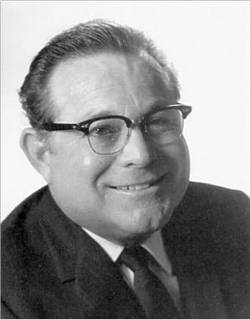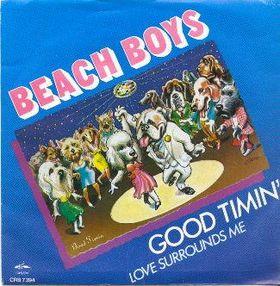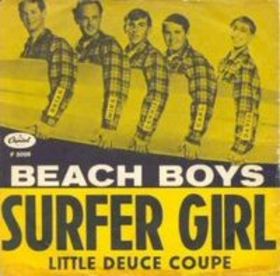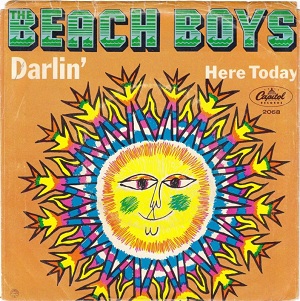
Murry Gage Wilson was an American songwriter, talent manager, record producer, and music publisher, best known as the father of the Beach Boys' Brian, Dennis, and Carl Wilson. After the band's formation in 1961, Murry became their first manager, and in 1962, he founded their publishing company, Sea of Tunes, with Brian. Later in his life, Wilson was accused of physically and verbally abusing his children, charges which he denied.

"Daydream Believer" is a song composed by American songwriter John Stewart shortly before he left the Kingston Trio. It was originally recorded by the Monkees, with Davy Jones singing the lead. The single reached No. 1 on the U.S. Billboard Hot 100 chart in December 1967, remaining there for four weeks, and peaked at No. 5 on the UK Singles Chart. It was the Monkees' third and last No. 1 hit in the U.S.

"Be True to Your School" is a song by American rock band the Beach Boys from their 1963 album Little Deuce Coupe. Written by Brian Wilson and Mike Love, it was issued as a single October 28, 1963. There are two versions of this song: the album version, and the single version, which added cheerleader yells by Honeys in between verses. The song features the melody of the University of Wisconsin's fight song, "On, Wisconsin!", although it is a tribute to Hawthorne High School, which the Wilson brothers attended. Hawthorne High School's fight song uses the same melody as "On Wisconsin".

"Help Me, Rhonda" is a song by American rock band the Beach Boys, appearing first on their 1965 album The Beach Boys Today! and subsequently in re-recorded form on the following 1965 album Summer Days . It was written by Brian Wilson, with additional lyrics by Mike Love. Unlike many other songs by the band from this period, "Help Me, Rhonda" features a lead vocal sung by Al Jardine.

"Don't Worry Baby" is a song by American rock band the Beach Boys from their March 1964 album Shut Down Volume 2. Written by Brian Wilson and Roger Christian, Wilson's lead vocal on the track is considered one of his defining performances, and he later referred to "Don't Worry Baby" as perhaps the Beach Boys' finest record. It was issued in May 1964 as the B-side of "I Get Around", and charted separately at number 24.

"Good Timin’" is a song by the American rock band the Beach Boys and the second single from their 1979 album L.A. . It is one of the few songs jointly credited to Brian and Carl Wilson.

"Surfer Girl" is a song by American rock band the Beach Boys from their 1963 album Surfer Girl. Written and sung by Brian Wilson, it was released as a single, backed with "Little Deuce Coupe", on July 22, 1963. The single was the first Beach Boys record to have Brian Wilson officially credited as the producer.

"Darlin'" is a song by American rock band the Beach Boys from their 1967 album Wild Honey. Written by Brian Wilson and Mike Love, it was inspired by singer Danny Hutton and was originally intended to be recorded by an early version of Three Dog Night. Carl Wilson ultimately sang the lead vocal.
"Shut Down" is a song written by Brian Wilson and Roger Christian for the American rock band the Beach Boys. The primary melody is a twelve-bar blues. On March 4, 1963, it was released as the B-side of the single "Surfin' U.S.A.", three weeks ahead of the album of the same name on which both tracks appeared. Capitol Records released it again later that year on the album Little Deuce Coupe. The single peaked at number 23 in the US on the Billboard Hot 100 chart, and number 34 in the UK.
"Cotton Fields (The Cotton Song)" (also known as In Them Old Cotton Fields Back Home) is a song written by American blues musician Huddie Ledbetter, better known as Lead Belly, who made the first recording of the song in 1940.

"I Can Hear Music" is a song written by Jeff Barry, Ellie Greenwich and Phil Spector for American girl group the Ronettes in 1966. This version spent one week on the Billboard Pop chart at number 100. In early 1969, the Beach Boys released a cover version as a single from their album 20/20 (1969), peaking at number 24 in the US.
"Come Go With Me" is a song written by C. E. Quick, an original member of the American doo-wop vocal group the Del-Vikings. The song was originally recorded by The Del-Vikings in 1956 but not released until July 1957 on the Luniverse LP "Come Go With The Del Vikings". The final version of the song was released in the second week of January 1957 and was led by Gus Backus. When Joe Averbach, the owner of Fee Bee Records couldn't handle the demand, he signed with Dot Records in late January 1957; the song became a hit, peaking at No. 5 on the US Billboard Top 100 Pop Charts. It also reached #2 on the R&B chart.
"Here Comes the Night" is a song by the American rock band the Beach Boys from their 1967 album Wild Honey. Written by Brian Wilson and Mike Love, the group later rerecorded the track for their 1979 album, L.A. , as a disco song lasting nearly eleven minutes. A four-minute edit of this version was released as a single on February 19, 1979 and reached number 44 on the U.S. Billboard Hot 100.

"Surf City" is a 1963 song recorded by American music duo Jan and Dean about a fictitious surf spot where there are "two girls for every boy". Written by Brian Wilson and Jan Berry, it was the first surf song to become a national number-one hit.
"Don't Break the Heart That Loves You" is an American song written by Benny Davis and Murray Mencher. The song was a success for two artists in two different genres: Connie Francis in the pop field in 1962 and Margo Smith as a country version in 1978.

"Wishing You Were Here" is a song written by Peter Cetera for the group Chicago and recorded for their album Chicago VII (1974), with lead vocals by Terry Kath, while Cetera sang the song's bridge. The third single released from that album, it reached No. 11 on the U.S. Billboard Hot 100, No. 9 on the Cash Box Top 100, and hit No. 1 on the Easy Listening chart.
"Rock 'n' Roll to the Rescue" is a song by American rock band the Beach Boys from their 1986 album Made in U.S.A. Written by Mike Love and Terry Melcher, it was released as a single on June 9, 1986 and reached number 68 on the U.S. Billboard pop singles chart.

"I Know You're Out There Somewhere" is a 1988 single by the English rock band the Moody Blues. It was written by guitarist Justin Hayward, and it is the sequel to the Moody Blues' 1986 single "Your Wildest Dreams", also written by Hayward. It is the band's final Top 40 single in the United States, peaking at #30 on the Billboard Hot 100.
"Mary, Mary" is a song written by Michael Nesmith and first recorded by the Paul Butterfield Blues Band for their 1966 album East-West. Nesmith's band, the Monkees, later recorded it for More of the Monkees (1967). Hip hop group Run–D.M.C. revived the song in the late 1980s, with an adaptation that appeared in the U.S. record charts.
"I Live for the Sun" is a 1965 single written by Rick Henn and performed by American pop band the Sunrays.












